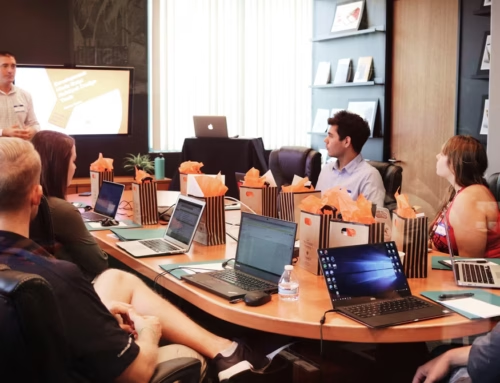In the fast-paced and ever-evolving business landscape, effective decision making and problem solving skills are paramount for success.
These skills not only influence individual performance but also significantly impact organizational growth and resilience.
At Portocol, we understand the complexities and pressures that executives face daily, and we are dedicated to empowering leaders with the tools they need to excel. Here’s 15 actionable strategies to enhance your decision making and problem solving abilities, both in your professional and personal life.
1. Embrace a Growth Mindset
Adopting a growth mindset is the foundation of improving your cognitive abilities. A growth mindset, as opposed to a fixed mindset, believes in the potential for development and learning. This perspective encourages continuous learning and resilience in the face of challenges.
Activity: Regularly reflect on your experiences and identify areas for improvement. Set aside time each week to review what went well, what didn’t, and what you can learn from each experience.
2. Enhance Emotional Intelligence
Emotional intelligence plays a crucial role in decision making and problem solving. High EQ helps you understand and manage your emotions and recognize and influence the emotions of others.
Tip: Practice active listening and empathy. When engaging in conversations, focus on understanding the other person’s perspective without immediately jumping to conclusions or solutions.
3. Utilize the Decision Making Framework
A structured decision making framework can streamline the process and reduce the risk of biases.
Steps:
- Identify the Problem: Clearly define the problem or decision to be made.
- Gather Information: Collect relevant data and insights.
- Evaluate Alternatives: Consider different options and weigh their pros and cons.
- Make a Decision: Choose the best alternative based on your evaluation.
- Implement the Decision: Put your chosen solution into action.
- Review and Reflect: Assess the outcomes and learn from the process.
Activity: Apply this framework to both small and large decisions to build a habit of structured thinking.
4. Foster Creative Thinking
Creative thinking enhances your ability to generate innovative solutions and think outside the box.
Exercise: Engage in brainstorming sessions without judgment. Set a timer for 10-15 minutes and write down as many ideas as possible. The goal is quantity, not quality. Review and refine the ideas later.
5. Strengthen Analytical Skills
Analytical skills enable you to break down complex problems and understand their components.
Activity: Solve puzzles and engage in activities that require logical thinking, such as Sudoku or chess. These activities sharpen your analytical abilities and improve your focus.
6. Practice Mindfulness and Stress Management
High stress can impair decision making and problem solving abilities. Mindfulness helps in managing stress and maintaining clarity of thought.
Tip: Incorporate mindfulness practices such as meditation, deep breathing exercises, or yoga into your daily routine. Even a few minutes a day can make a significant difference in your mental clarity and emotional stability.
7. Seek Diverse Perspectives
Diverse perspectives provide a broader view of potential solutions and reduce the risk of blind spots.
Strategy: Create a diverse team with varied backgrounds and expertise. Encourage open discussions and value different viewpoints. This practice not only enhances decision making but also fosters an inclusive and innovative work environment.
8. Develop Critical Thinking
Critical thinking involves analyzing facts objectively to form a judgment. It’s essential for making informed decisions and solving problems effectively.
Exercise: Regularly challenge your assumptions and ask probing questions. Practice Socratic questioning by asking questions like:
- What evidence supports this?
- Are there alternative interpretations?
- What are the implications?
9. Use Technology and Tools
Leverage technology to improve decision making and problem solving processes.
Tools:
- Data Analytics Software: Use tools like Tableau, Qlik or Power BI to analyze data and gain insights.
- Project Management Tools: Tools like Trello, Asana or ClickUp help in organizing tasks and tracking progress.
- Decision Making Apps: Apps like MindMeister for mind mapping or Decision Matrix Analysis for weighing options can be very helpful.
10. Continuous Learning and Development
The business environment is dynamic, and continuous learning is essential to stay ahead.
Tip: Enroll in courses, attend workshops, and read extensively on topics related to decision making and problem solving. At Portocol, we offer tailored executive coaching programs designed to equip leaders with the latest strategies and skills.
11. Apply the 5 Whys Technique
The 5 Whys technique helps in identifying the root cause of a problem by asking “Why?” five times, providing deeper insights than simply asking “What went wrong?”.
Activity: When faced with a problem, ask “Why?” repeatedly until you reach the underlying cause. This method not only helps in solving the current issue but also prevents future occurrences.
12. Scenario Planning
Scenario planning prepares you for various potential futures and helps in making robust decisions.
Strategy: Develop multiple scenarios based on different assumptions about the future. Plan your actions for each scenario, and identify common strategies that work across multiple scenarios.
13. Balance Intuition and Data
While data-driven decisions are crucial, intuition also plays a significant role.
Tip: Trust your intuition, especially when you have substantial experience in a particular field. Use data to validate your instincts and make balanced decisions.
14. Encourage a Feedback Culture
Feedback provides insights into the effectiveness of your decisions and areas for improvement.
Strategy: Create a culture where feedback is regularly given and received. Use feedback to refine your decision making and problem solving processes.
15. Develop Resilience
Resilience helps in bouncing back from setbacks and learning from failures.
Activity: Practice resilience-building activities such as setting realistic goals, maintaining a positive outlook, and learning from failures. Reflect on past challenges and identify the strengths you used to overcome them.
Conclusion
Improving decision making and problem solving abilities is a continuous journey that requires dedication, practice, and an open mind. By embracing these strategies, you can enhance your cognitive skills, make more informed decisions, and effectively tackle challenges in your personal and professional life.
At Portocol, we are committed to supporting you on this journey with our executive coaching in Denver CO. To learn more about our programs, contact us today!





